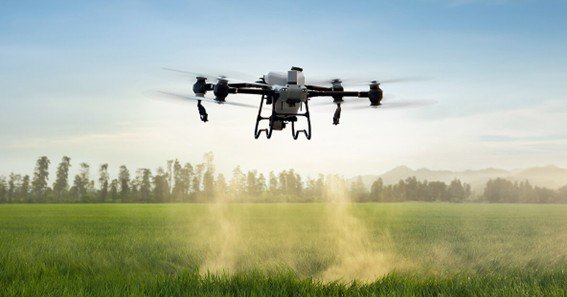In the evolving landscape of modern agriculture, DJI agricultural drones have emerged as pivotal tools, offering innovative solutions for crop spraying, field mapping, and crop monitoring. These drones enable farmers to enhance efficiency, reduce costs, and promote sustainable farming practices.
Key Models in DJI’s Agricultural Drone Lineup
DJI offers a range of agricultural drones tailored to meet various farming needs:
- DJI AGRAS T50: Equipped with a powerful coaxial twin-rotor propulsion system, the AGRAS T50 can carry payloads of up to 40 kg for spraying and 50 kg for spreading. Its advanced dual spraying system and phased array radar make it suitable for diverse agricultural applications.
- DJI AGRAS T25: A more compact model, the AGRAS T25 offers flexibility and efficiency for smaller-scale operations while maintaining robust spraying and spreading capabilities.
- DJI Mavic 3M: Designed for precision agriculture, the Mavic 3M features multispectral imaging capabilities, allowing farmers to assess crop health and optimize resource allocation effectively.
Benefits of Using DJI Agricultural Drones
Implementing DJI agricultural drones in farming operations offers several advantages:
- Efficiency: Drones can cover large areas quickly, reducing the time and labor required for tasks such as spraying and mapping.
- Precision: Advanced sensors and imaging technologies enable targeted interventions, minimizing waste and environmental impact.
- Cost-Effectiveness: By optimizing resource use and reducing the need for manual labor, drones can lead to significant cost savings over time.
- Data-Driven Decisions: High-quality data collection allows farmers to make informed decisions, improving crop yields and overall farm management.
How to Acquire DJI Agricultural Drones
To purchase DJI agricultural drones, consider the following options:
- Authorized Dealers: DJI has a network of authorized agricultural drone dealers worldwide. You can locate a dealer near you through DJI’s official website.
- Official Partners: Companies like Talos Drones are official partners of DJI, offering the latest agricultural drones, accessories, and consultation services.
FAQs
1. What are the primary uses of DJI agricultural drones?
DJI agricultural drones are primarily used for crop spraying, field mapping, and crop health monitoring, enhancing efficiency and precision in farming operations.
2. Are DJI agricultural drones suitable for small farms?
Yes, models like the DJI AGRAS T25 are designed for flexibility and efficiency, making them suitable for smaller-scale farming operations.
3. How can I ensure compliance with local regulations when using agricultural drones?
It’s essential to familiarize yourself with and adhere to local aviation and agricultural regulations. Consulting with local authorities or agricultural extension services can provide guidance tailored to your region.
4. What kind of training is required to operate DJI agricultural drones?
Proper training is crucial for safe and effective operation. DJI offers training programs through the DJI Academy, and authorized dealers often provide hands-on training sessions.
5. How do DJI agricultural drones contribute to sustainable farming?
By enabling precise application of fertilizers and pesticides, DJI agricultural drones reduce chemical runoff and environmental impact, promoting more sustainable farming practices.









